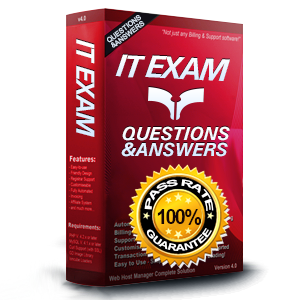
1Z0-071 Exam Questions & Answers
Exam Code: 1Z0-071
Exam Name: Oracle Database 12c SQL
Updated: Apr 25, 2024
Q&As: 394
At Passcerty.com, we pride ourselves on the comprehensive nature of our 1Z0-071 exam dumps, designed meticulously to encompass all key topics and nuances you might encounter during the real examination. Regular updates are a cornerstone of our service, ensuring that our dedicated users always have their hands on the most recent and relevant Q&A dumps. Behind every meticulously curated question and answer lies the hard work of our seasoned team of experts, who bring years of experience and knowledge into crafting these premium materials. And while we are invested in offering top-notch content, we also believe in empowering our community. As a token of our commitment to your success, we're delighted to offer a substantial portion of our resources for free practice. We invite you to make the most of the following content, and wish you every success in your endeavors.

Download Free Oracle 1Z0-071 Demo
Experience Passcerty.com exam material in PDF version.
Simply submit your e-mail address below to get started with our PDF real exam demo of your Oracle 1Z0-071 exam.
![]() Instant download
Instant download
![]() Latest update demo according to real exam
Latest update demo according to real exam
* Our demo shows only a few questions from your selected exam for evaluating purposes
Free Oracle 1Z0-071 Dumps
Practice These Free Questions and Answers to Pass the Oracle Database Exam
Examine this query Which executes successfully:
SELECT job, deptno FROM emp
UNION ALL
SELECT job, deptno FROM jobs_ history;
What will be the result?
A. It will return rows common to both SELECT statements.
B. It will return rows from both SELECT statements after eliminating duplicate rows.
C. It will return rows that are not common to both SELECT statements.
D. It will return rows from both SELECT statements including duplicate rows.
Which two statements are true regarding roles? (Choose two.)
A. A role can be granted to itself.
B. A role can be granted to PUBLIC.
C. A user can be granted only one role at any point of time.
D. The REVOKE command can be used to remove privileges but not roles from other users.
E. Roles are named groups of related privileges that can be granted to users or other roles.
View the exhibit and examine the ORDERS table.

The ORDERS table contains data and all orders have been assigned a customer ID. Which statement would add a NOT NULL constraint to the CUSTOMER_ID column?
A. ALTER TABLE orders MODIFY CONSTRAINT orders_cust_id_nn NOT NULL (customer_id);
B. ALTER TABLE orders ADD CONSTRAINT orders_cust_id_nn NOT NULL (customer_id);
C. ALTER TABLE orders MODIFY customer_id CONSTRAINT orders_cust_nn NOT NULL (customer_id);
D. ALTER TABLE orders ADD customer_id NUMBER(6)CONSTRAINT orders_cust_id_nn NOT NULL;
Which statement is true about Data Manipulation Language (DML)?
A. DML automatically disables foreign ley constraints when modifying primary key values in the parent table.
B. Each DML statement forms a transaction by default.
C. A transaction can consist of one or more DML statements.
D. DML disables foreign key constraints when deleting primary key values in the parent table, only when the ON DELETE CASCADE option is set for the foreign key constraint.
The ORDERS table has a column ORDER_DATE of date type DATE The default display format for a date is DD-MON-RR Which two WHERE conditions demonstrate the correct usage of conversion functions?
A. WHERE ordet_date> TO_CHAR(ADD_MONTHS(SYSDATE, 6),'MON DD YYYY')
B. WHERE TO_CHAR(order_date,'MON DD YYYY') ='JAN 20 2019';
C. WHERE order_date> TO_DATE('JUL 10 2018','MON DD YYYY');
D. WHERE order_date IN (TO_DATE ('Oct 21 2018','MON DD YYYY'), TO_CHAR('Nov 21 2018','MON DD YYYY'));
E. WHERE order_date> TO_DATE(ADD_MONTHS(SYSDATE,6),'MON DD YYYY');
Viewing Page 3 of 3 pages. Download PDF or Software version with 394 questions

